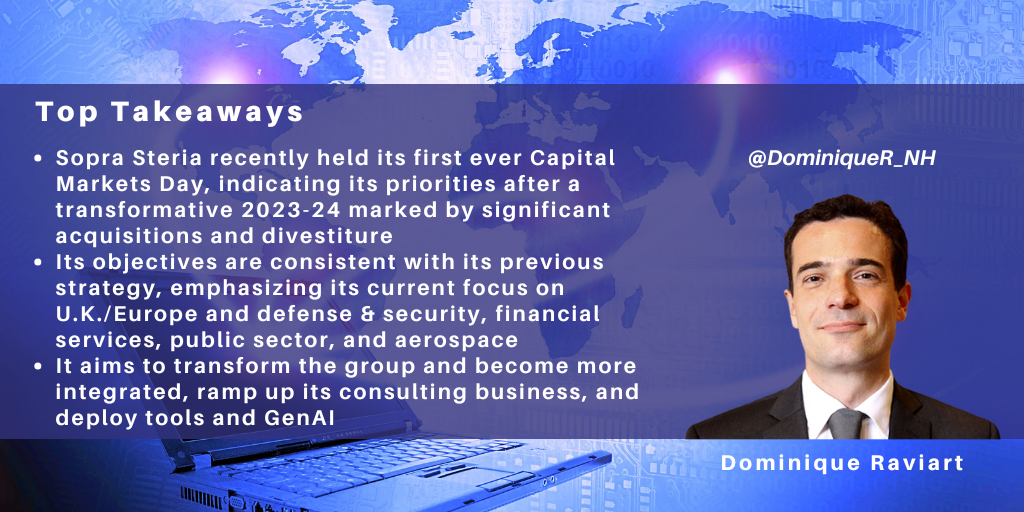Search posts by keywords:
Filter posts by author:
Related Reports
Related NEAT Reports
Other blog posts
posted on Jan 03, 2025 by Dominique Raviart

Sopra Steria recently held its first Capital Markets Day. Following significant scope changes (including in Benelux and its defense & security sector business) and the sale of its Sopra Banking Software business, the company, now mainly an IT service pure-play, highlighted its strategic priorities. Its 2028 plan shared by management is consistent with previous announcements.
The company is looking to deepen its capabilities in its existing geographies and verticals, current accounts, and portfolio; for example, by expanding its consulting arm, Sopra Steria Next. The company also highlighted the recent creation of a COO position to drive service repeatability, integrate the group further, and accelerate its M&A strategy.
Sopra Steria has guided for lower organic growth (2 to 5% until 2028) than it has historically achieved, expressing a degree of caution in the economic outlook.
Scale in Existing Markets
Scale is a priority: the company is looking to reach revenues of €1bn in each of its core international markets. The priorities are Benelux (~€0.6bn in NelsonHall-estimated 2024 revenues), Scandinavia (i.e., Norway, ~€0.6bn), and Germany (~€400m, excluding a specific JV). Of course, the U.K. (with revenues at ~€1bn) remains essential.
Despite the slowdown in Europe, Sopra Steria has maintained its current focus on U.K./Europe. Management believes the company has enough room for growth in its core countries, where it will deploy its vertical expertise in financial services, public sector, aerospace, defense & security. The first three verticals have long been a core element of Sopra Steria, whereas the expansion in defense & security is more recent, with a presence in France and the U.K. The next priority is Belgium’s expansion, targeting NATO and the EU.
Cloud, Security, and Consulting
Unsurprisingly, portfolio management is also a priority, with Sopra Steria targeting 60% of its revenues by 2028 coming from digital, cloud, and security (up from under 50% currently). Management emphasizes the company’s cloud infrastructure and application migration capabilities with increased attention on cloud run services/orchestration, along with cybersecurity. Data, AI/GenAI, and platform services (e.g., SAP, Salesforce, and ServiceNow) are also on the menu.
Consulting is an area that Sopra Steria wants to develop, reaching ~12% of revenues by 2028, up from 9% currently. This is not the first time that Sopra Steria has announced a push in consulting, with previous plans to reach 15% of revenues. The company shed more light on its expansion ambitions: taking more responsibility over transformation projects, aligning with Sopra Steria’s key verticals and offerings, and deploying methodologies across geographies. Tuck-in acquisitions are likely, complemented by price increases and market share gains.
Operational Scrutiny
One corporate development highlighted during the Capital Markets Day is the recent creation of a COO position. Beyond service portfolio management, the priorities are HR, finetuning the operating model, and driving service repeatability. Sopra Steria has traditionally been a federation of business units rather than a highly integrated group, to an extent a reflection of past acquisitions and the specificities of each market. With the creation of the COO role, the company is now looking to achieve more harmonization across operations, easier onboarding of cross-country deals, and simplified acquisition integration.
Sopra Steria is also looking to accelerate tooling deployment. The company has 50% of its developers using its Digital Enablement Platform (~12k users) and Inner Data (for data transformation). The company has deployed several GenAI use cases (part of its rAIse program) for project management, consultants, and developers. ML is also a priority; for instance, using ML for tracking project status and identifying those with early signs of struggles.
Subdued Ambitions in Offshore
The company wants to raise its headcount share of xshore countries from 13% to ~20% during 2024-28. The effort is significant. However, Sopra Steria still only considers India to lower its costs (and also access its talent). The company has not yet considered how pure offshore-based service offerings can target new clients or geographies. The examples of Capgemini with its Financial Services unit and Tietoevry with Create come to mind, both of which have been successful units.
Management Caution on the Outlook
With these initiatives, we expected a significant improvement in Sopra Steria’s financial outlook. In particular, the divestment of Sopra Banking Software, which had weighed on both revenue growth and profitability since 2018, will remove one area of softness.
However, Sopra Steria has surprised the markets by guiding for 2 to 5% organic growth in 2025-28, signaling it may not achieve its CAGR of 4.5% achieved in the 2016-2023 period. Obviously, current market conditions in France and Germany are impacting the company’s guidance for the next three years. Nevertheless, one should not see Sopra Steria as being cautious, given its accelerated M&A strategy. The company wants to acquire €1bn in revenues from M&As over the 2025-2028 period. That’s much more than the annual €100m that the company achieved pre-COVID.
Clearly, Sopra Steria wants to emerge in 2028 as a more integrated firm across geographies, be more centralized in terms of productivity tools, reuse country expertise more widely, and put further emphasis on operations. The M&A activity will strengthen existing capabilities: defense & security is one priority; public sector and financial services are another. We also would like to see more tuck-in acquisitions in digital, security, and cloud migration to accelerate the portfolio transition.
